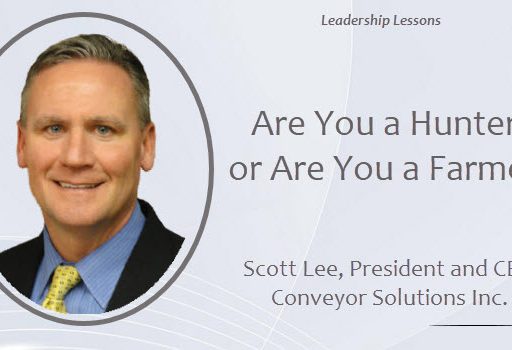Are You a Hunter, or Are You a Farmer?
Scott Lee, President and CEO of Conveyor Solutions, Inc.
TMJ: Can you give a brief overview of your career journey and where you are today?
Lee: I started my material handling career on the customer side of the fence after graduating from college in industrial engineering. While working, I completed my MBA in the first few years out of school then shifted from the customer to the supplier side. After spending a couple of years with a small systems integrator, I left and started a new company with a partner.
After 15 years, my partner retired, and I purchased the remaining shares. Immediately following the buyout, I started building a leadership and management team that could take us from a “lifestyle” to a “platform” company. This allowed us to start building a foundation for a scalable organization. The next step was to implement a holding company and start building vertical companies to support a larger business. After a few acquisitions and organic startups, we now had the internal resources, leadership, planning and structure to start growing. We’ve experienced double-digit growth ever since.
We’ve continued to embrace the strategic planning process and weaved in EOS about four years ago to provide traction to the initiatives and goals generated through the planning process.
TMJ: What changes have you witnessed during your tenure and what things have stayed constant?
Lee: One of the changes has been consolidation. Such as, manufacturers purchasing integrators, larger integrators purchasing smaller ones and a combination of the former fueled by private equity.
We’ve also seen that the material handling and supply chain industry moved from the back room, hidden from sight, and to the forefront as a competitive advantage and go-to-market strategy.
A lot of the legacy knowledge base has retired out of the material handling space leaving a large hole. This accelerated during COVID and the transfer of knowledge to the next generation didn’t happen as it would have in the past. The sales teams lack the real-time experience due to this hole.
COVID disrupted and accelerated countless activities in the material handling world. This includes the significant growth in e-commerce, lack of qualified labor resources and the increased cost of labor. Companies now employ people in multiple states and leverage technology to keep them connected to one another, their vendors and clients.
As for technology advancements, electronics are now attached to or controlling almost everything. Goods-to-person picking and transportation are now common-place and come in many forms. Software (WCS/WES/WMS) provides instant feedback to make intelligent, real-time decisions. Above all else, data collection and distribution are king.
Customers cut back on internal engineering and project management resources requiring the integrator or manufacturer to provide more guidance earlier in the design process and throughout the implementation.
Even with all the changes, the industry remains incredibly competitive. Many clients still struggle with cost justification for larger projects and project timelines from inception to completion require patience. Costs continue to rise while lead times grow and shrink based on the sharp increases in demand.
TMJ: If you had to pick an overarching theme of your leadership journey, what would it be?
Lee: The simple answer is coming to terms with your leadership style. Embracing your strengths while surrounding yourself with others who have your blind side.
Like sales, there are two types of leaders: there are hunters, and there are farmers. Hunters tend to be more visionary. They are looking to lead people and their organization forward into the future. They aren’t as concerned about management, detailed operations, etc.. They tend to take more risks and see the glass as half full.
On the flip side, farmers are wonderful leaders and typically focus “in the now.” They often find themselves being hands on and engaging in the day-to-day decisions rather than overly concerned about tomorrow.
I’ve learned it is critical to have both styles functioning in your business and perfectly aligned.
TMJ: What are three words that describe your leadership style?
Lee: Visionary, passionate and honest.
TMJ: What was one of the biggest challenges you ever faced and how did you address it?
Lee: Growth! As your business expands, it requires a significant reinvestment in resources. Many of these investments are not directly related to revenue generation, engineering or labor services. These new roles are required internally to support, manage and lead an organization. This includes sales support, accounting and finance, human relations, etc. Many business owners are reluctant to make these investments because they see them as direct overhead, adding limited value and detracting from the bottom line. This couldn’t be further from the truth. Every time we reach this ceiling of complexity, we leap – after many internal conversations – and invest in these resources. Each time it took us to the next level, creating a solid foundation and freeing up other resources to focus on what they do best!
TMJ: What advice would you give to an emerging leader or someone new to the industry?
Lee: There will be times when the grass may look greener on the other side. However, you can grow your own green grass if you’re diligent, spend your time constructively, tackle tough obstacles and be consistent in these efforts. Being successful in this industry does not come easy but very likely with hard work and time.
TMJ: What is the best business advice you ever received and from whom?
Lee: Your time is your most valuable asset.
Get to “no” as quickly as possible so you can spend most of your time with those who say “yes.” While I’m not sure who said it first, this advice has been handed down for decades and rings true daily.
While this is common in a sales role, you also must do that in all aspects of your business. Some people spend a lot of time in this industry trying to convince others that their way is the best and the only way. I found that getting to a place where it’s okay to walk away may be the best solution saving both time and money.
Another great piece of advice is “Take the time to understand to be better understood.”
When a challenge arises, rather than digging in and defending your position, take a time out. Step back and start asking questions. This will often allow you to see something from a different viewpoint. It will also allow the other party to communicate their thoughts. The net result is a constructive conversation where a middle ground is reached rather than a winner and a loser.
This is probably a made-up story, but I like it. Somebody asked Michelangelo “When you start a sculpture, it looks like a big block. How do you know what that thing’s going to look like at the end?” He said, “I simply take away the things that don’t belong.” It’s the same way here. You don’t know what you’re going to end up with, you just extract things you don’t want. So, take the time to understand somebody else, and then get rid of everything else. It’s a good way to solve a problem quickly.
TMJ: Is there anything else you would like to add?
Lee: Time and time again, I’ve watched those who didn’t want to share, join or teach, live a sheltered and less fulfilled life. Knowledge is power. The ability to let down your guard, learn something new, then share it with others is priceless. This builds the foundation for lifelong relationships with like-minded peers.




